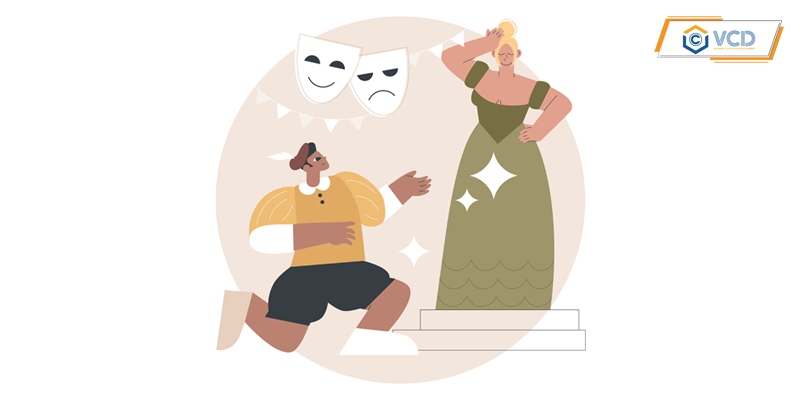Do you need permission to re-perform a play?
Re-performing a famous play seems to be just a normal artistic activity, but in fact it is directly related to copyright and performance rights. So, do you need permission to re-perform a play, and who do you need permission from? Let’s find out more details with VCD in the article below.
What is a play?
A play is a work of theatrical art built on the basis of a literary script, expressed through the performance of actors, dialogue, gestures, music, lighting and stage set. Dramatic works can be spoken drama, cheo, tuong, cai luong, puppetry, musicals, physical drama, etc.
According to Article 11 of Decree 22/2018/ND-CP, theatrical works are a type of performing art work, protected by copyright law. This means that every play, whether classical or contemporary, is protected from unauthorized copying, performance or exploitation.
A play is not only the result of an artistic creation but also a valuable intellectual property. Therefore, when organizing a performance, re-enactment or re-exploitation of a play, the performer needs to clearly understand copyright rights and obligations to avoid violating the law.
Do you need permission to re-perform a play?
According to Article 20 of the 2022 Law on Intellectual Property, the author or copyright owner has the right to:
- Allow others to perform the work in public;
- Allow the adaptation, modification or re-enactment of the work;
- Receive royalties, remuneration or material benefits when the work is exploited.
Therefore, re-performing a play without permission is an act of copyright infringement. Whether you keep the content or just “borrow the idea”, that action still needs the approval of the copyright owner.
However, there are cases where permission is not necessary:
- If the play has expired (50 years after the author’s death), the work becomes public property, you do not need permission but must still clearly state the author’s name and must not distort the content.
- If you perform non-commercially (only for study, research, no fee, no recording for release), you may be exempt from asking for permission but must cite the source and respect the original work.
For example: A group of students re-enact Romeo and Juliet for a school performance competition. If they do not sell tickets, do not make a profit, and only perform internally, they may not need permission, but if they post it on social networks or perform for tickets, it will be a public performance and must be permitted by the copyright owner.

Whom do you need permission from when you want to perform a play again?
To perform legally, the organizer needs to ask permission from the copyright owner. Specifically, you can contact the following entities:
- The author of the script (if still alive);
- The author’s legal heir;
- The organization, theater or copyright holder (if the author has transferred the rights);
- Or the Vietnam Center for Theatre Copyright (VCPAA) – the authorized representative of many authors and theatre units.
Applications for permission to re-perform a play usually include:
- Title of the work, name of the author, script to be performed;
- Scope, time, location of performance;
- Purpose of use (commercial or non-commercial performance);
- Agreement on royalties, remuneration or copyright fees;
- Commitment not to modify or distort the original work.
Permission should be made in writing (contract, license, confirmation email, etc.) to have a legal basis if a dispute arises later.
Risks of re-performing a play without permission
Many amateur theater groups, students, or performance organizers think that “just performing for fun, not charging money” is okay. But in reality, re-performing a play without permission can still be considered copyright infringement according to Article 28 of the 2022 Intellectual Property Law.
Risks that may be encountered if re-performing a play without permission include:
- Being administratively sanctioned: According to Decree 131/2013/ND-CP, the act of using or performing a work without permission can be fined from 15 to 35 million VND. In addition, violators are also: forced to stop performing or remove infringing videos and clips; forced to apologize and make public corrections; forced to return all revenue from the performance.
- Being sued in civil court: Copyright owners can file a lawsuit to request compensation for damages (including material and mental losses). In some cases, they are also required to pay many times the copyright fee if they intentionally violate.
- Damage to reputation and honor: In addition to legal damages, being discovered to “perform illegally” or “illegally create famous scripts” can cause the performance unit to lose reputation, affect the image of the individual, the theater troupe and future cooperation opportunities.
Above are all the answers to the question “Do you need permission to re-perform a play?” that VCD shares with you. Before re-enacting or re-performing any theatrical work, check the protection period and ask permission from the copyright owner to ensure all activities are legal and transparent.
Sincerely,
FAQ
Permission may still be required for internal performances, especially if there is a fee, widespread promotion, or recording and rebroadcasting on social media. Only certain cases of educational, non-commercial use and non-publication are exempted from permission.
Yes. Any act of adapting, modifying, converting or modifying the content of a play must have permission from the author or copyright owner. Arbitrarily changing the content and then performing it may be considered copyright infringement and will be handled according to regulations.
